This article was medically reviewed by Shari Forschen, NP, MA. Shari Forschen is a Registered Nurse at Sanford Health in North Dakota. Shari has worked in healthcare since 1996 and her expertise lies in acute care bedside nursing on a medical oncology floor. She received her degree from Medcenter one College of Nursing in 2003 and her Family Nurse Practitioner Masters from the University of North Dakota in 2014. Shari is a member of the American Nurses Association.
There are 15 references cited in this article, which can be found at the bottom of the page.
wikiHow marks an article as reader-approved once it receives enough positive feedback. This article received 15 testimonials and 80% of readers who voted found it helpful, earning it our reader-approved status.
This article has been viewed 748,095 times.
Experts say a normal resting heart rate is typically between 60 to 100 beats per minute (bpm), but most healthy adults have a resting heart rate that's below 90 bpm.[1] Your heart rate, also called your pulse, is the measurement of how many times your heart beats in a 1 minute period. Research suggests that a lower heart rate is typically a sign of better cardiovascular health, though it may be a cause for concern if you're not a trained athlete.[2] We'll show you how to assess your heart rate, exercise properly, and make a few lifestyle adjustments so you can start lowering your resting heart rate.
Steps
Expert Q&A
-
QuestionWhat does it mean if I have a high pulse rate but normal blood pressure?
 Shari Forschen, NP, MAShari Forschen is a Registered Nurse at Sanford Health in North Dakota. Shari has worked in healthcare since 1996 and her expertise lies in acute care bedside nursing on a medical oncology floor. She received her degree from Medcenter one College of Nursing in 2003 and her Family Nurse Practitioner Masters from the University of North Dakota in 2014. Shari is a member of the American Nurses Association.
Shari Forschen, NP, MAShari Forschen is a Registered Nurse at Sanford Health in North Dakota. Shari has worked in healthcare since 1996 and her expertise lies in acute care bedside nursing on a medical oncology floor. She received her degree from Medcenter one College of Nursing in 2003 and her Family Nurse Practitioner Masters from the University of North Dakota in 2014. Shari is a member of the American Nurses Association.
Master's Degree, Nursing, University of North Dakota If you are symptomatic with dizziness and/or shortness of breath, then I recommend evaluation by physician. Simple things like dehydration, high caffeine intake, and stress can increase pulse. Practice deep breathing, making time for yourself and meditation to reduce stress.
If you are symptomatic with dizziness and/or shortness of breath, then I recommend evaluation by physician. Simple things like dehydration, high caffeine intake, and stress can increase pulse. Practice deep breathing, making time for yourself and meditation to reduce stress. -
QuestionI'm a 47 year-old male, and my resting heart rate is 72 bpm. How do I reduce my resting heart rate?
 Shari Forschen, NP, MAShari Forschen is a Registered Nurse at Sanford Health in North Dakota. Shari has worked in healthcare since 1996 and her expertise lies in acute care bedside nursing on a medical oncology floor. She received her degree from Medcenter one College of Nursing in 2003 and her Family Nurse Practitioner Masters from the University of North Dakota in 2014. Shari is a member of the American Nurses Association.
Shari Forschen, NP, MAShari Forschen is a Registered Nurse at Sanford Health in North Dakota. Shari has worked in healthcare since 1996 and her expertise lies in acute care bedside nursing on a medical oncology floor. She received her degree from Medcenter one College of Nursing in 2003 and her Family Nurse Practitioner Masters from the University of North Dakota in 2014. Shari is a member of the American Nurses Association.
Master's Degree, Nursing, University of North Dakota See the above article for examples on how to do this. Starting exercise routine (after proper assessment and authorization from your primary care provider) can help reduce heart rate, weight and work towards obtaining lower resting heart rate. Eliminating caffeine, stress and nicotine can also reduce pulse rates.
See the above article for examples on how to do this. Starting exercise routine (after proper assessment and authorization from your primary care provider) can help reduce heart rate, weight and work towards obtaining lower resting heart rate. Eliminating caffeine, stress and nicotine can also reduce pulse rates.
Things You'll Need
- Watch or clock with a second hand or stopwatch.
References
- ↑ https://www.health.harvard.edu/blog/resting-heart-rate-can-reflect-current-future-health-201606179806
- ↑ https://www.mayoclinic.org/healthy-lifestyle/fitness/expert-answers/heart-rate/faq-20057979
- ↑ http://www.webmd.com/heart-disease/heart-failure/watching-rate-monitor
- ↑ http://www.heart.org/HEARTORG/Conditions/More/MyHeartandStrokeNews/All-About-Heart-Rate-Pulse_UCM_438850_Article.jsp
- ↑ http://www.health.harvard.edu/blog/increase-in-resting-heart-rate-is-a-signal-worth-watching-201112214013
- ↑ http://www.heart.org/HEARTORG/GettingHealthy/PhysicalActivity/FitnessBasics/Target-Heart-Rates_UCM_434341_Article.jsp
- ↑ https://www.vacardio.com/fast-heart-rate-when-to-worry/
- ↑ http://www.heart.org/HEARTORG/Conditions/More/MyHeartandStrokeNews/All-About-Heart-Rate-Pulse_UCM_438850_Article.jsp
- ↑ https://www.vacardio.com/fast-heart-rate-when-to-worry/
- ↑ http://www.cdc.gov/physicalactivity/basics/adults/index.htm
- ↑ http://www.heart.org/HEARTORG/Conditions/HighBloodPressure/PreventionTreatmentofHighBloodPressure/Physical-Activity-and-Blood-Pressure_UCM_301882_Article.jsp
- ↑ http://www.mayoclinic.org/healthy-lifestyle/fitness/in-depth/exercise-intensity/art-20046887?pg=2
- ↑ http://www.webmd.com/fitness-exercise/the-truth-about-heart-rate-and-exercise?page=3
- ↑ http://www.heart.org/HEARTORG/HealthyLiving/PhysicalActivity/FitnessBasics/Target-Heart-Rates_UCM_434341_Article.jsp#.Vt47mY-cHIU Show less
- ↑ http://www.heart.org/HEARTORG/GettingHealthy/PhysicalActivity/FitnessBasics/Target-Heart-Rates_UCM_434341_Article.jsp
- ↑ http://www.heart.org/HEARTORG/HealthyLiving/PhysicalActivity/FitnessBasics/Target-Heart-Rates_UCM_434341_Article.jsp#.Vt47mY-cHIU Show less
- ↑ http://www.heart.org/HEARTORG/Conditions/HighBloodPressure/PreventionTreatmentofHighBloodPressure/Physical-Activity-and-Blood-Pressure_UCM_301882_Article.jsp
- ↑ http://www.mayoclinic.org/healthy-lifestyle/fitness/in-depth/exercise-intensity/art-20046887?pg=2
- ↑ http://www.health.harvard.edu/blog/increase-in-resting-heart-rate-is-a-signal-worth-watching-201112214013
- ↑ http://www.health.harvard.edu/blog/increase-in-resting-heart-rate-is-a-signal-worth-watching-201112214013
- ↑ http://www.ncbi.nlm.nih.gov/pubmed/15730434
- ↑ https://www.vacardio.com/fast-heart-rate-when-to-worry/
- ↑ http://www.uhs.umich.edu/caffeine
- ↑ http://www.ncbi.nlm.nih.gov/pmc/articles/PMC1767471/
- ↑ http://www.health.harvard.edu/blog/increase-in-resting-heart-rate-is-a-signal-worth-watching-201112214013
About This Article
To lower your resting heart rate, start by getting at least 150 minutes of moderate intensity aerobic exercise, like brisk walking, every week. Then, do push-ups, planks, or other muscle strengthening activities at least twice a week. You should also try to maintain a healthy weight, since carrying extra weight makes it harder for your heart to pump blood throughout your body. Additionally, reduce your consumption of coffee, tea, and other caffeinated drinks, which are known to increase heart rate. For more tips from our Medical co-author, like how to find your target heart rate for exercise, read on!
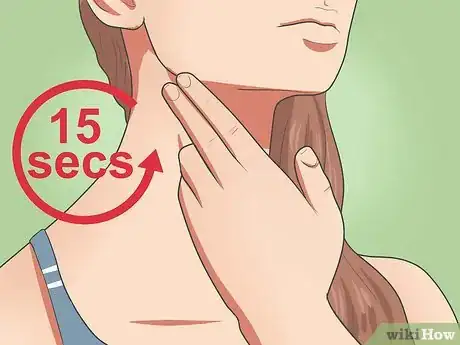
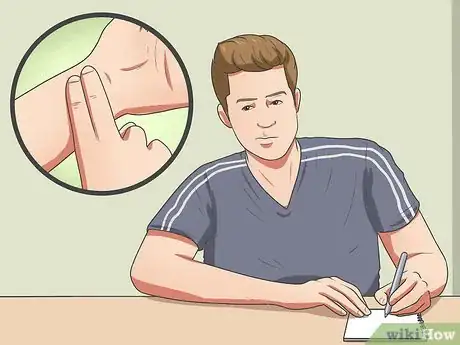

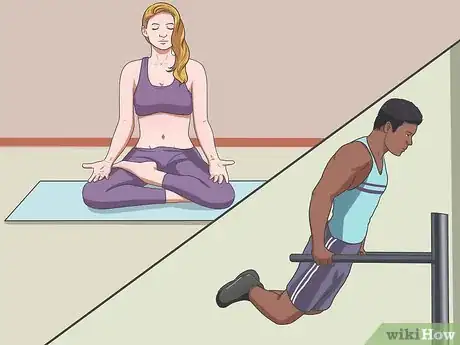
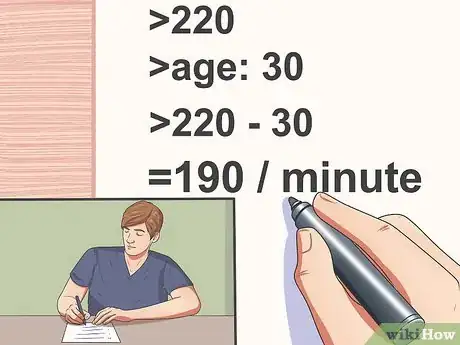

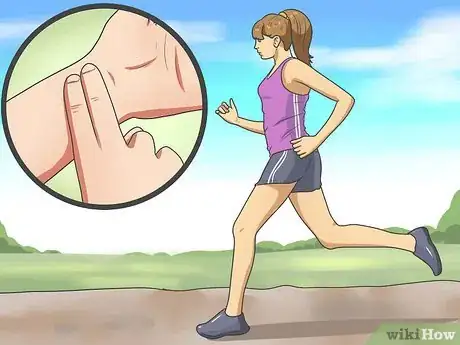

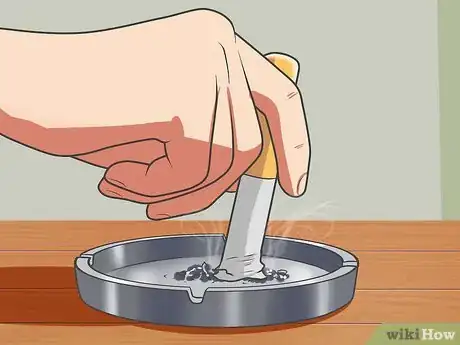
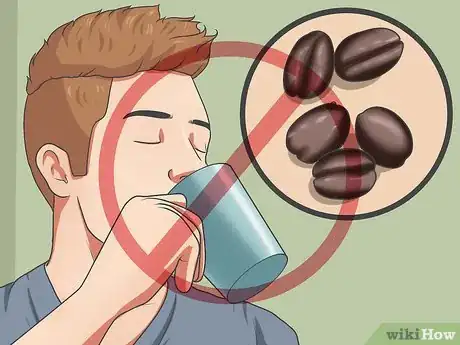
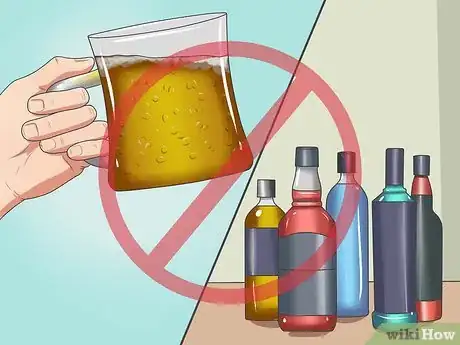
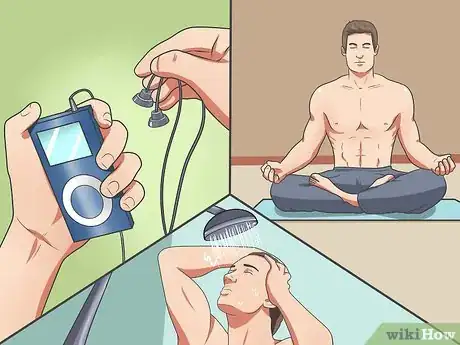



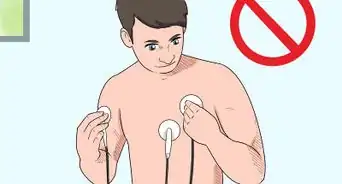


























































Medical Disclaimer
The content of this article is not intended to be a substitute for professional medical advice, examination, diagnosis, or treatment. You should always contact your doctor or other qualified healthcare professional before starting, changing, or stopping any kind of health treatment.
Read More...